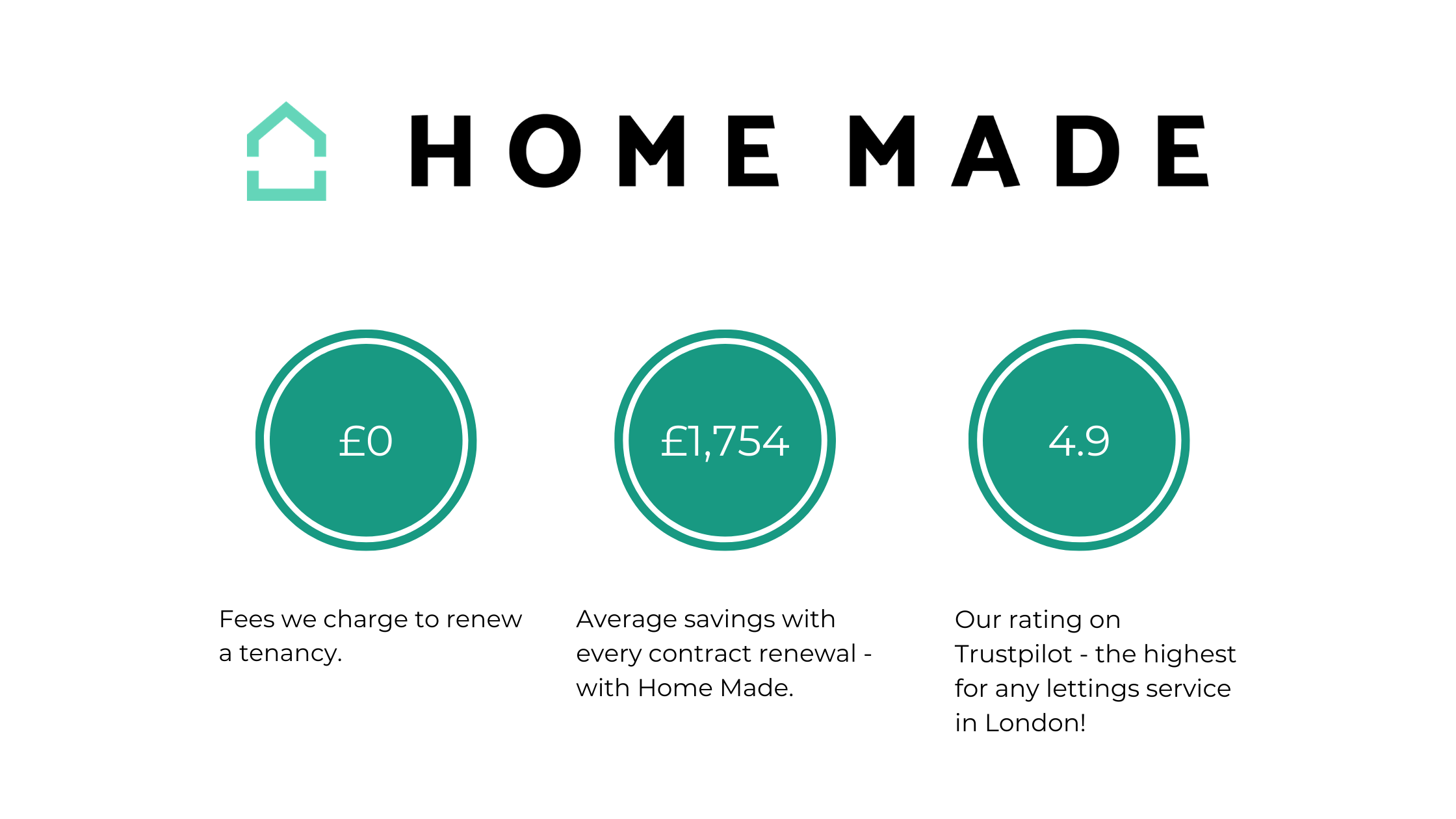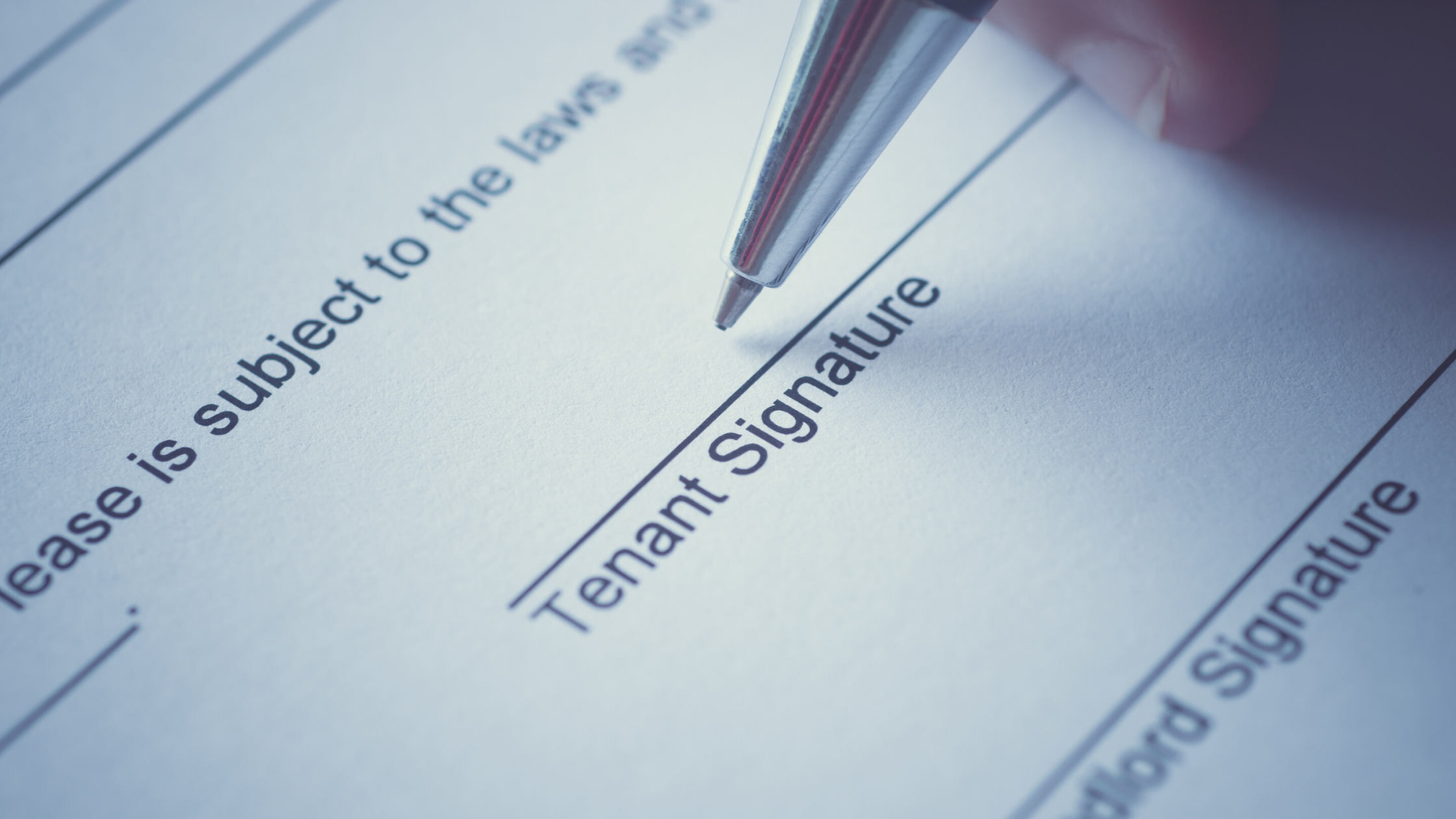Tenancy Renewal: A How-To Guide for Landlords
Due to the upheaval caused by COVID-19, a greater number of landlords and renters are choosing to renew existing contracts rather than face the uncertainty of renting and letting in the middle of an ongoing pandemic. Landlords always seek to keep good renters at their property for as long as possible to reduce costs and renters generally prefer to build a stable home in one property rather than go through the hassle of moving each year. However, the mutual benefits of renewing a tenancy agreement are even clearer to both parties in light of current circumstances.
As so many Home Made customers have been in touch with queries to ask how they go about securing a renewal of their current tenancy agreement, we have put together this guide to walk landlords through the process during the pandemic and beyond.
Starting the Conversation
The best time to approach your renters is 12-16 weeks before the end of the fixed term. The objective is to give yourself plenty of time to negotiate terms with your renters while knowing well in advance if you need to prepare to remarket your property.
Initiating the conversation earlier will encourage your tenants to think about their plans for the end of the tenancy so you can get clarity sooner. If your renters intend to leave at the end of the fixed term, you can make plans to remarket your property in plenty of time to find new tenants without risking a lengthy void period.
It also gives you more time to persuade renters to stay if they aren’t yet sure about their next steps or if you’re struggling to agree on terms. If you reach an impasse when negotiating the renewal, you have a limited window prior to your current occupants committing to a new rental property to resolve the disagreement and avoid remarketing the property.
Negotiating Terms
Though this is the most delicate stage of the renewal process, it remains much more straightforward to negotiate a renewal than a new tenancy. The relationship between landlord and renter matures over the course of the fixed term, particularly where the landlord manages the property directly, and both parties approach tenancy renewals from a position of greater trust. When there is a good relationship, there is flexibility and a willingness to compromise that doesn’t necessarily exist at the start of the tenancy.
The two key considerations that should form the basis of your negotiating strategy as a landlord are pricing and length of tenancy. This is true whether you are renewing or entering into a new contract, but there are some subtle differences to bear in mind when retaining existing renters.
Pricing
The key to a successful pricing strategy is research. As is the case when your property initially enters the market, it is essential to understand your pricing leverage. Comprehensive knowledge of the local market is required to work out what you could realistically achieve if you were to relet the property.
The market may have changed significantly since the property was advertised for let. There are several reasons for this:
- If your contract length is less than 12 months, the property may return to a different seasonal market than when it was let. For instance, if you enter into a contract in December and the fixed term ends 18 months later in June then demand for property, and thus rental asking prices, is likely significantly higher as summer is peak rental season.
- Major economic events, such as the current recession caused by the pandemic, can exert downwards pressure on demand and pricing. Conversely, economic recovery and wage growth might nudge rents up.
- Developments in the local area may have increased or decreased its desirability - for instance, the introduction of new transport links or an influx of new businesses.
Once you have determined the going rate for your local area, you need to think about expenses and cash flow. This is where the calculation differs most significantly compared with entering a new tenancy agreement. The cost differential between retaining good renters and remarketing the property is quite significant and this must be factored into your negotiating strategy.
If a tenancy agreement is renewed you avoid marketing fees and costly void periods where you remain liable for utility bill, council tax, and mortgage payments without any rental income. It is therefore worth using the additional headroom represented by the absence of certain marketing costs to be more flexible with your current renters.
This approach is particularly salient in the current economy. The residential lettings market is quieter than usual for the time of year and many renters are struggling to afford the same monthly commitments as they did pre-COVID. There is thus less demand in the market and many renters are looking to downsize or reduce their rent in their current property. When negotiating a renewal, working with a renter to offer lower slightly lower rent could see you better off in the long term than if you attempt to remarket. Take the following example:
A landlord currently receives £1,800pcm for a 2-bedroom flat in a tenancy that is due to expire shortly. The renters explain that, due to coronavirus, it will be harder for them to meet the same monthly rate and request a 5% reduction in rent. There are several possible scenarios, but let’s explore two likely outcomes.
Scenario A
The landlord declines the offer, serves notice, and opts to place the property back on the market at £1,800pcm. The landlord instructs two agents to market the property and receives three offers. Two offers are between 5-10% under asking price and one offer is at the asking price but has a proposed start date of one month after the end of the current fixed term for a period of 12 months. The landlord accepts the asking price offer and the current renters vacate at the end of the fixed term, leaving the property empty for one month.
During the one month void, the landlord must pay a mortgage of £1,225 from their own pocket (as there is no rental income to cover costs), council tax of £103, utility bills totalling £30, and £75 inc VAT to renew a gas safety certificate. The letting agent charges 5% plus VAT* for tenant find services, meaning a fee of £1,296. In total the costs are £2,729. In the 12 months following the end of the previous tenancy the landlord receives £19,800 in gross rent.
Scenario B
The landlord agrees to reduce the monthly rent by 5% to £1710 for the current tenants and they renew for 12 months. There are no void costs and no remarketing fees, but the landlord has to pay the £75 inc VAT for a new gas safety certificate and a renewal fee of £140 plus VAT* to the original agent, bringing total expenses to £243. The landlord receives a gross rental income of £20,050.00 over the 12 month period following the end of the original fixed term.
*Home Made charges a success-based fee of £948 plus VAT for tenant find services or 3% plus VAT where the monthly rent exceeds £3000. We don’t, and never have, charged renewal fees - we don’t believe in them!

The above plausible hypothetical scenarios demonstrate the value of showing flexibility with current tenants vs trying to achieve higher rents with new renters. This is true even without the market shock caused by a recession. The level of risk involved with remarketing the property, and consequently your pricing leverage with current renters, will always depend on market conditions. Do your research and balance the costs involved with re-letting the property against achievable monthly rental income, as well as considering your own personal finances and any cash flow issues you might face if your property is vacant.
Contract Length
The second major factor to consider when negotiating a renewal is contract length. Wherever possible you should seek to structure your rental contract to allow your property to return to the market at the moment you would enjoy maximum pricing leverage. The best time to end a contract is generally in the June to September peak period for lettings, but this will vary between type and location of property so research is essential.
For example, if the fixed term of the tenancy expires in December you should aim to negotiate a renewal for 18 months. Aim for longer contracts (unless your personal circumstances are such that you need greater flexibility) and think strategically about break clauses.
Pricing and contract length are your two main negotiating levers, so use them wisely. If you’re in a position to concede on pricing then try to secure a longer contractual commitment in return, and likewise aim for higher rent if the renter wants a shorter fixed term. It is easy to view any tenancy negotiation as a zero sum game but this isn’t the case. It’s important to remember that you are working towards the same goal with your renters: they want to live at your property and you want to keep them there. Give and take on price and length of tenancy and eventually both parties will meet in the middle.
Tenancy Administration & Compliance

Tenancy Agreement
Once you have agreed terms, the next stage is to formalise your agreement with a new contract. Your agent will handle the administration process and the fees for this service should be set out in the terms of business you signed at the point of instruction. Once the landlord and renters have confirmed the terms of the renewal, the necessary paperwork can be drawn up and issued to all parties for signature.
Compliance
It is important to ensure at this stage that you are up to date with all your compliance obligations as a landlord. You should make sure to address the following:
- Ensure that all compliance documents related to the property are valid.
- Confirm the Right to Rent status of all tenants.
- Check for any changes in regulation since the property was let.
All your compliance documents (EPC, gas safety certificate etc) will have their own individual expiration dates and must be renewed accordingly. These dates won’t necessarily align with the end of your fixed term, but a tenancy renewal nevertheless represents a good opportunity to audit your records and ensure everything is up to date. This is particularly the case with gas safety certificates, as these are often performed near to the start of a new tenancy and must be updated annually.
It’s also important to remember that, if you are unable to agree to terms for a renewal or there is a dispute for any reason, you won’t be able to serve a Section 21 notice to regain vacant possession at the end of the fixed term if you aren’t meeting all of your legal obligations.
If your renter’s Right to Rent status is time-limited then follow up checks must be performed at either the expiration date of their original documents or 12 months after the original check (whichever falls later). Before signing the new tenancy agreement, make sure that you (or the agent acting on your behalf) have completed follow-up checks if necessary and make copies of any new Right to Rent documents.
Finally, you should review your legal obligations as a landlord to keep yourself informed of any updates to regulation that require action. For example, as of 1st July 2020 landlords are now required to provide new renters with a copy of a valid EICR certificate prior to the commencement of a new tenancy (including renewals) and/or provide current tenants with a valid EICR by 1st April 2021.
Additionally, if your tenancy commenced prior to the introduction of the Tenant Fee Act in June 2019, you will need to refund any amount of the deposit taken above the new cap of 5 weeks’ rent (or 6 weeks’ rent if your annual rent exceeds £50,000). Depending on how the deposit was registered, either you or the agent acting on your behalf will need to arrange the refund with your tenants.
Renewals with Home Made
If you let your property with Home Made, we will take care of your tenancy renewal free of charge regardless of whether you opted for our tenant find or our full management service.
As a Home Made landlord, you can expect our Operations team to:
- Let you know when it’s time to think about renewing.
- Reach out to your tenants upon your instruction.
- Assist with the negotiation of terms.
- Make sure you have valid copies of all the compliance documents you need and help you to arrange any third-party services if required.
- Draw up and issue the new contract.
- Attend to any necessary deposit administration.
You can visit our landlord’s page to learn more about our services. If you would like to speak with us about your property needs, contact us via our website to find out how we can help.
At Home Made, we offer a hybrid lettings solution that adds value at every stage of the rental process. With our game-changing new landlord platform, The Property Wallet, we offer London landlords exceptional tenant-find and property management services for a low monthly fee.
- Avoid expensive upfront fees and spread the cost of marketing your property with the option to pay monthly.
- Free rent collection and arrears chasing.
- Sign off and see all charges and payments in your dashboard.
- Real-time updates on marketing, viewings, and offers.
Prices start from just £50+VAT/mo for tenant-find and £60+VAT/mo for management. Alternatively, you can pay a one-off upfront fee of £1,200+VAT for our tenant-find service.
If you would like to speak with us about your property needs, contact us via our website to find out how we can help. If you're ready to get started, book your free valuation here.
Book valuationCheck out more of our landlord advice here and follow us on Twitter, Linkedin, and Instagram for regular updates on industry compliance standards, market insights, and Home Made company news.




